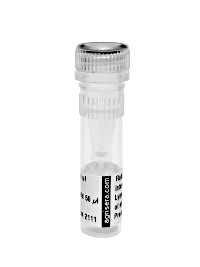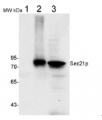1

Anti-PIP (PIP1;1, PIP1;2, PIP1;3, PIP1;4, PIP1;5) aquaporins, DyLight® 650 conjugated (40 µg)
- Product Info
-
Immunogen: KLH-conjugated synthetic peptide conserved in Arabidopsis thaliana: PIP1;1 UniProt: P61837,At3g61430 PIP1;2 UniProt: Q06611,TAIR: At2g45960 PIP1;3 UniProt: Q08733,TAIR: At1g01620 , PIP1;4 UniProt: Q39196,TAIR: At4g00430, PIP1;5 UniProt: Q8LAA6 TAIR:At4g23400 Host: Rabbit Clonality: Polyclonal Purity: Immunogen affinity purified serum, in PBS pH 7.4, conjugated to DyLight® 650.
Format: Liquid in PBS pH 7.4. Quantity: 40 µg Storage: Store at 4°C for 12-18 months, A preservative may be added for long time storage up to 2 years. Spin briefly the tube before use. Tested applications: Immunofluorescence (IF), Western blot (WB) Recommended dilution: To be determined by end user. Expected | apparent MW: 30.68 | 28 kDa - Reactivity
-
Confirmed reactivity: Arabidopsis thaliana, Brassica sp,, Jatropha curcas L, cv, Biji Jarak , Mesembryantheum crystallinum, Populus nigra, Populus trichocarpa, Raphanus sativus, Thellungiella salsuginea Predicted reactivity: Brassica sp., Hordeum vulgare, Juglans regia, Nicotiana tabacum, Oryza sativa, Populus tremula, Triticum aestivum, Vicia faba
Species of your interest not listed? Contact usNot reactive in: No confirmed exceptions from predicted reactivity are currently known. - Additional Information
-
Additional information: Antibodies will detect target protein in a few µg of a crude preparation loaded per well. If purified preparations of vacuolar and plasma membranes are used, one µg load per well should be sufficient.
DyLight® 650 has Amax = 652 nm, Emax = 672 nm. DyLight® is a registered trademark of Thermofisher Inc., and its subsidiaries.Additional information (application): Protein or membrane sample should be treated at 70°C for 10 min before loading on the gel. - Background
-
Background: PIPs proteins are aquaporins which facilitate the transport of water and small neutral molecules across the cell membrane. Alternative names: PIP1-1, PIP1-2, PIP1-3, plasma membrane intrinsic protein 1a, 1b, 1c, PIP1a, PIP1b, PIP1c, plasma membrane aquaporin-1, transmembrane protein A, TMP-A, AthH2, transmembrane protein B, TMP-B. - Protocols
-
Agrisera Western Blot protocol and video tutorials
Protocols to work with plant and algal protein extracts
Agrisera Educational Posters Collection
- Reviews:
-
This product doesn't have any reviews.
Accessories

AS07 213 | Clonality: Polyclonal | Host: Rabbit | Reactivity: Higher plants including A.comosus, A.thaliana, C.sativus, C. australis R.Br, C.reinhardtii, F. margarita Swingle, H.vulgare, L.esculentum, L.longiflorum, Malus x domestica Borkh. c.v. Fuji, M. truncatula, M.crystallinum, N.tabacum, N.caerulescens, O.sativa, P.hybrida cv. Mitchell, Populus sp., P.vittata, Thellungiella sp., T. aestivum, Z.mays, V. vinifera | Cellular [compartment marker] of tonoplast membrane

AS07 260 | Clonality: Polyclonal | Host: Rabbit | Reactivity: [global antibody] for di- and monocots, conifers, ferns, mosses, green algae | Cellular [compartment marker] for plasma membrane
Benefits of using this antibody

AS08 327 | Clonality: Polyclonal | Host: Rabbit | Reactivity: Arabidopsis thaliana, Zea mays | Cellular [compartment marker] of Golgi in immunolocalization and of COP1 in western blot

